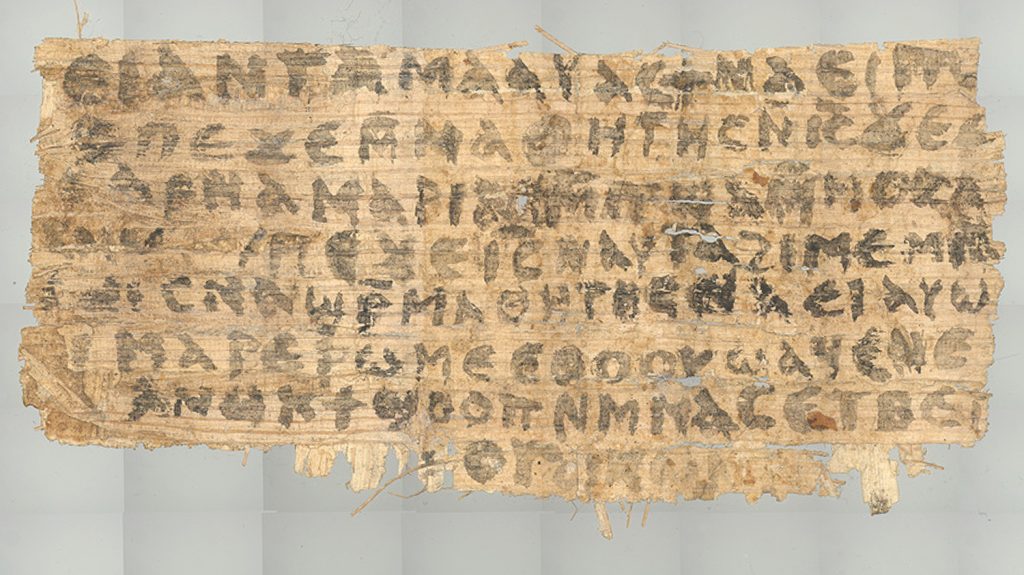Today in 2012, a small scrap of papyrus dubbed the Gospel of Jesus’ Wife (above) was unveiled in Rome by Karen L King, a Harvard professor. The papyrus, written in the Coptic language, apparently recorded fragments of a conversation between Jesus and his disciples in which he says, ‘My wife… she will be able to be my disciple’. King said that the ink and papyrus dated from the 4th century CE, and that the text may have been written as early as the 2nd century. This caused a sensation, fuelling the sexy idea that Jesus was married to Mary Magdalene and that he was a proto-feminist. It also caused a storm in the acacemic world, as King’s fellow scholars tore (metaphorical) holes in the papyrus, demonstrating it was almost certainly a hoax. Four years later, a journalist was finally able to show that the papyrus had been forged, and the professor duped, by a man with a hatred of academia and the Catholic Church.
My mother gave to me life…
The disciples said to Jesus…
deny. Mary is [not] worthy of it…
Jesus said to them, ‘My wife…
she will be able to be my disciple…
Let wicked people swell up…
As for me, I will dwell with her
in order to…
The fake Gospel of Jesus’ Wife
Revd Henry Boyd, vicar of Drumgath in Ireland and first translator of Dante’s Divine Comedy into English poetry, died today in 1832. He was happily translating Dante’s Inferno when he came across a demon in the eighth circle of Hell who comically uses his arse as a trumpet. How to translate this line for prim Victorian readers? Boyd gave musical farts a new euphemism when he described them as ‘loud Aeolian fifes’.
The Scottish Victorian novelist and theologian George MacDonald died today in 1905. He has been hugely influential as the author of early fantasy fiction works such as Phantastes and Lilith, as well as for his children’s works, including At the Back of the North Wind and The Princess and the Goblin. MacDonald and his wife Louisa were close friends of Lewis Carroll, and their children became some of the first readers of Alice’s Adventures in Wonderland. Their love of Carroll’s manuscript overcame his uncertainty about whether he should offer it to a publisher. Since MacDonald’s death, he has had a profound influence on authors as varied as GK Chesterton, Mark Twain, CS Lewis and Neil Gaiman.
‘The dead must have their own sorrows too, but when they find it is well with them, they can sit and wait by the mouth of the coming stream better than those can wait who see the going stream bear their loves down to the ocean of the unknown. The dead sit by the river mouths of Time: the living mourn upon its higher banks.’ George MacDonald, The Miracles of Our Lord
It is the feast day of St Joseph of Cupertino. A 17th-century monk, Joseph had a surprisingly well authenticated gift for levitation that got him into considerable trouble with the Church. Hovering above the ground during Mass was such a distraction for other monks that he was confined to his cell, and he was also accused of witchcraft, which attracted the attention of the Inquisition. He was made a saint 100 years after he died, and is now the patron saint in charge of air travellers.
Today in the year 324, Constantine, the first Christian Roman emperor, defeated his rival for the empire, Licinius, at the Battle of Chrysopolis near Chalcedon in Asia Minor. Licinius marched into battle displaying the images of Roman gods, while Constantine’s troops fought under the the sign of the chi-rho, the symbol of Christ. His victory made him sole ruler of Roman world. He followed up a few months later by having Licinius hanged.
Image: Harvard University
